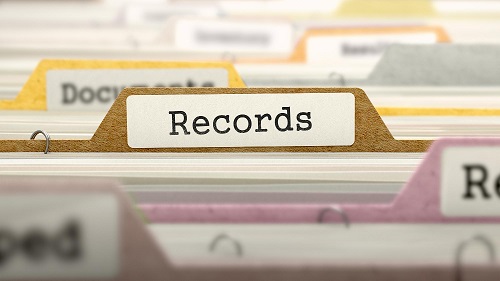Record keeping is important for any business, but it’s especially important for pest control and other property services businesses. Not only is it to keep your operations streamlined and organised, but to protect you from liability if something is to go wrong.
When you’re starting out, you may have relatively few documents and won’t yet see the need to have a proper record keeping system. But beware! Invoices, work orders, customer details, pesticide use records and other compliance paperwork stack up fast! Before you know it, you’ll have bits of documentation all over the show and no way of finding what you’re looking for.
The best approach to building a smoothly run business is to start with an organised record keeping system from the get-go. If you’ve already set up your business and have no system in place, there’s no better time to start than now – the first month of the new financial year.
Here’s what you need to know.

What we mean by records
When we refer to records, we don’t mean the musical kind. They’re documents that contain information about your business’s job activity and customers. Different businesses will have different records, but below are some that are most used for our industry. We also tell you what each document should include (note this is not an exhaustive list):
- Chemical use
These records should include the name of the pesticides/other chemicals, the amount used, the date and time of application, and the location of the application. Read our article: Record Keeping When Using Chemicals for more information.
- Customer contact information
This should include the customer’s name, address, phone number, and email address. You may even want to add details of conversations you’ve had so you can add that extra personal touch to later conversations. Don’t have a customer relationship management (CRM) system yet? Read about the benefits of moving off an Excel spreadsheet and into something more sophisticated here.
- Work orders
These should include a description of the work performed, the date and time of service, and the technician who performed the service. Commentary on the job done and any challenges faced and/or overcome will also be useful.
- Paperwork for compliance obligations
As a property services provider you have compliance paperwork obligations, and these records should be kept well filed so you can easily access them at a later date. This includes the afore-mentioned chemical usage records as well as chemical risk assessment paperwork (read: How to Do a Risk Assessment When Using Chemicals) and any Safe Work Method Statements.
- Invoices
This should include the date of your service, the services provided, the cost of the services, and the payment terms. You should also be keeping and filing invoices that come in for your business’s purchase of products and services – these are especially important for tax time.
- Inspections and treatment plans
Obviously, you need to keep records of inspections you’ve done on your customers’ properties as well as the job activity carried out (not just the chemical usage) and any ongoing treatment plans.
If you’re a pestie who deals with termites, here’s one you definitely need: Termite Management Plan: What It Is & Why You Need It. For those doing pre-purchase inspections on properties, read: Pre-Purchase Inspection Reporting.
Then of course there’s recruitment and training records, WHS reports, PPE maintenance records, your daily balance sheet, loan statements, email records, and more… Including your insurance policies!

Why is record keeping important?
There are several reasons to keep your records safe, organised and in proper order. Here are just a few of them:
To comply with regulations
In most of Australia, property services businesses are required by law to keep records of their chemical use and adherence to other industry regulations. This helps to ensure that job activity is performed safely and responsibly.
To protect yourself from liability
If a customer gets sick or injured after your company has tended to their property, you could be held liable. Keeping good records can help your insurer support you through any legal claims.
To improve your service
By tracking your pest control treatments, cleaning and maintenance work, inspection reporting and other job activity, you can see what works and what doesn’t. This information can help you to develop more effective job activity strategies for the future.
To save money
With good record keeping you can see how much you’re spending on supplies and other supporting goods. This info can help you to identify areas where you can save money.
To build customer trust
When customers see that you’re taking the time to keep accurate records, they’ll be more likely to trust you and your company. To find out more about improving your customer relations, check out our piece on Customer Service Strategies For Pest Controllers. They apply across a wide range of business types.

Keeping records efficiently – how to do it
There are several ways to keep records efficiently and one business may do it very differently from another. The important thing is to find a system that works for you and one that you can stick to!
Below we lay out a simple and efficient system you could use for your record keeping:
#1 Create a filing system
This will help you to keep your records organised and easy to find. You can use a physical filing cabinet or an electronic filing system. If you use a physical filing cabinet, label each folder clearly and store it in a central location. If you use an electronic filing system, create folders for each type of record and store them on a secure server.
#2 Scan your paper record
If you have a lot of paper records, you may want to scan them and store them electronically. This will make them easier to access and search. PS – If you’d like to cut down on paper and take your business online once and for all, check out our piece titled How To Take Your Business Digital.
#3 Create a database
A database can help you to track your job activity and customer information. You can use a commercial database or create your own. If you create your own, make sure to include the following fields:
- Customer name
- Customer address
- Customer phone number
- Customer email address
- Job type
- Chemicals used
- Date and time of application
- Location of application
- Team member who performed the service
- Invoice amount
#4 Back up your records regularly
This will help protect your business in case of a data loss. You can back them up to an external hard drive, a cloud storage service, or both.
#5 Assign responsibility for record keeping
If it’s not you, make sure that one person is responsible for maintaining your records. This person should be familiar with the record keeping system and be able to answer any questions that you or your staff may have.
#6 Review your records regularly
This will help you to identify any gaps in your record keeping system and make sure that your documentation is up to date.

How long should I keep my records?
The length of time you should keep your records depends on several factors, including the type of record and the laws and regulations that apply to it. This could be three years, seven years or for the life of your business.
Here are some specific examples of how long different types of records should be kept:
Tax records
These should be kept for at least seven years. This is the standard retention period for most businesses. However, if you’ve ever been audited by the Australian Taxation Office, you should keep your tax records for as long as the statute of limitations for that audit applies.
PS – Don’t forget to check out our Tax Deductions For Your Business article.
Employment records
Employment records should be kept for at least four years. This includes records of employee wages, hours worked, and benefits.
Customer records
These should be kept for at least three years. This includes records of customer names, addresses, phone numbers, and purchase history.
Vendor records
Vendor records should be kept for at least three years. This includes records of vendor names, addresses, phone numbers, and invoice history.
Business contracts
These should be kept for the life of the contract.
Legal documents
Legal documents, such as incorporation papers, business licenses, and property deeds, should be kept permanently.

These additional articles could provide more information to help you while you’re in business documentation mode: Why You Need Effective Business Systems And Processes and Business Planning For The New Year.
The best record of all: Business insurance
Managing your own business comes with stresses – don’t let a lack of insurance be one of them. If something does go wrong during a pest control job, building inspection, cleaning activity, maintenance work or similar, you’ll want to be able to put things right quickly and easily, without taking a hit that could cost you hundreds of thousands of dollars.
Rapid Solutions has decades of industry experience in providing property services businesses with affordable, quality professional indemnity insurance and general liability insurance. We offer personalised customer service with our in-house claims service that’s focused on fast turnaround times. Contact Rapid Solutions today if you have questions about our insurance cover or training courses to support and protect your business.

